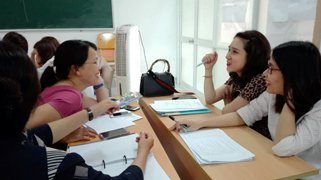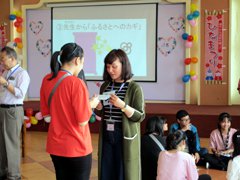What Is the Role of Japanese-Language Specialists?
The Japan Foundation Center for Cultural Exchange in Vietnam (Da Nang)
KURODA Tomonari
We are Japanese-Language Specialists, but what is our job? Do we hold seminars on the Japanese-language teaching methods? Do we promote the JF Standard for Japanese-Language Education and "Marugoto: Japanese Language and Culture"? Do we answer questions related to the Japanese language?
These are, of course, all important tasks that we do. However, communicating such knowledge, skills, and information is no longer our only job, especially when it comes to supporting secondary education. Here, I will discuss the expanding role of the individuals in charge of supporting secondary education at the Japan Foundation Center for Cultural Exchange in Vietnam (hereinafter "JFVN").
Aiming for "Participant-Centered" Training
We, the individuals in charge of supporting secondary education at JFVN, continuing in FY2018–2019(1) as well, are continuing the one-year Follow-Up Training Program (hereinafter the "Training Program") with the "learner-centered" theme that started from the Nationwide Training introduced in the 2018 Report (in Japanese). Additionally, we are continuing efforts to make the training more "participant-centered" than last year.
In the National Training (2) that was the starting point for the Training Program, we Japanese-Language Specialists previously showed the definition of "learner-centered," but this time, we started by considering "learner-centered" from "what kind of face we want students to have during class" and had the participating teachers (3) consider what they should pay attention to in order to create those faces. Then, we deepened the understanding of "learner-centered" by considering what society will be like after students become adults, and then expressed this through short plays.

Teachers at the Joint Program in the Central Part of Vietnam having a discussion
Of course, the teachers are the main focus of the Joint Training (4) that is conducted in each region. The primary content of the joint training are the research lesson practice reports from the teachers who participated in the Training Program and the introduction of "learner-centered" lesson activities from teachers who did not participate in the training program. Through discussions, teachers analyze these reports and the activities that were introduced, propose ways to improve them, and come up with new activity methods. We hope that teachers will increase improvement to activity methods and learn how to improve their lessons by communicating their practices and coming up with improvement plans and new ideas in this way. Furthermore, the teachers who participated in previous trainings and in the current Training Program are also responsible for the progress of these discussions. In other words, there are almost no opportunities for us Japanese-Language Specialists to stand before them. We believe that what they should learn is not within the Japanese-Language Specialists, but it is already within the teachers themselves, and it is our role to ensure that the things the teachers should learn come out smoothly.
The teacher program at the Japanese Camp for Junior High School Students in Vietnam (5) (the "JHS Student Camp") has created opportunities for the participating teacher to experience the role of supporting learning. At JFVN, in addition to developing the instructional abilities of our teachers, we also emphasize developing their ability to support students' learning. As part of this, at the JHS Student Camp, we held a teacher program that was focused on "looking at" students. In this program, the participating teachers solely observed the participating students. Then, from those observations, they discovered students' strengths and efforts and wrote them down on cards as a message. The cards written like this were completely covered in messages. On the final day of the camp, the students who received these cards were surprised, saying "Why do you know me so well?", and were moved that the teachers had paid so much attention to them. The faces of the teachers handing over these cards, and the faces of the students receiving these cards, were both shining and happy. What we'd like the teachers to learn through this is that the students' emotions and surprise are the teachers' joy, and that they support the students' learning.

A teacher giving a message card at the JHS Student Camp
The Expanding Role of Japanese-Language Specialists
Communicating knowledge and information is still an important role for Japanese-Language Specialists, and, in addition to that, our role of support learning is also increasing. Learning support is a new role for Japanese-Language Specialists.
Our society never pauses, and in modern times the rate of change is increasing. As such, we must always be autonomously learning so that we are not left behind, and we must always be changing so that we can adapt to the changes in society. The same is true for Japanese-language learners, Japanese-language teachers, and also for Japanese-Language Specialists. That is why Japanese-Language Specialists themselves will first take on the challenge of new roles and will continue to have an attitude of learning from them. Then, they show that attitude to local Japanese-language learners and Japanese-language teachers, which is to say that the Japanese-Language Specialists themselves continue to be "learners" and study together with the Japanese-language learners and Japanese-language teachers in their hometowns. This is the most important thing, and I believe that it is what supports learning.
- (1)The description of the year is based on the Vietnamese academic calendar. In Vietnam, the new academic year begins in late August to September. The 2018–2019 fiscal year is from September 2018 to August 2019.
- (2)Implemented in July 2018.
- (3)Unless otherwise specified, Vietnamese Japanese-language teachers at secondary educational institutions supported by The Japan Foundation Center for Cultural Exchange in Vietnam are "teachers."
- (4)Held twice yearly in Vietnam's Northern (Hanoi, Haiphong), Central (Hue, Da Nang, Quy Nhon), and Southern (Ho Chi Minh, Binh Duong, Ba Ria-Vung Tau) regions.
- (5)Please refer to the Ho Chi Minh City article for an overview of the JHS Student Camp.
- What We Do Top
- Arts and Cultural Exchange [Culture]
- Japanese-Language Education Overseas [Language]
- Japanese-Language Education Overseas [Language] Top
- Learn Japanese-language
- Teach Japanese-language
- Take Japanese-Language Test
- Know about Japanese-language education abroad
- The Japanese-Language Institute, Urawa
- The Japanese-Language Institute, Kansai
- Japanese-Language Programs for Foreign Specified Skilled Worker Candidates
- Japanese Language Education for Japanese Children Resident Overseas and for the Descendants of Migrants
- Archives
- Japanese Studies and Global Partnerships [Dialogue]
- JF digital collection
- Other Programs / Programs to Commemorate Exchange Year
- Awards and Prizes
- Publications
